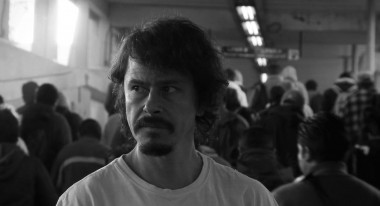 Back to selection
Back to selection
Latinbeat: Five Vettings and a Funeral
 The Militant
The Militant Once again, this festival of both rarefied and salt-of-the-earth films from all over Latin America graces the Big Apple at the Walter Reade Theater, once again with a delicious menu that does the Film Society of Lincoln Center proud.
I’ve been drawn to Latinbeat since now-retired FSLC Program Director Richard Peña established it in 1997. It has consistently displayed not only fine titles but also a less apparent connective tissue that has been expertly if unconsciously simulated, one affording us more than single plotlines, and which provokes a pleasurably heady and arty stretch.
Now in its 15th edition, the films in Latinbeat were co-selected by programmer Marcela Goglio and other colleagues from 1999 until she became solo top gun in 2007. Recently the Film Society terminated the perfectly bilingual Goglio, a both authoritative and diligent native of Argentina, that rarity who knows how to work the difficult gatekeepers and bureaucracies frequently found throughout Latin America. That, of course, is a management decision.
“I am used to Marcela being Latinbeat!” a shocked New York-based South American journalist told me. I learned long ago that anyone, no matter how gifted or capable, is ultimately dispensable. I became concerned for the festival itself. This being Goglio’s final outing, I asked Director of Programming Dennis Lim what this means for Latinbeat’s future, whether in its current form or reshaped into something else, or if it will simply vanish. I received this response from an FSLC spokesperson:
The Film Society is very much committed to continuing to support and program films from this important region that tend to get overlooked. We plan to continue programming them through our runs and series, as we have done in the past.
Following was a list of some screenings and activities linked to Latin America from the past year or scheduled for the near future:
A Matias Piñeiro retro tied to a run of his new film, Viola, which we opened; representation of Latin American films in this year’s Art of the Real, New Directors/New Films, and Newfest series; theatrical openings of Papirosen and Neighboring Sounds; the recent selection of Lisandro Alonso as our Filmmaker in Residence; and a series scheduled early next year that will also represent the region, but it’s too early to discuss.
I can only deduce that Latinbeat is destined for the dustbin.

With all due respect, I find the response troubling. I understand the tendency to move away from exhibitions of, say, national cinemas, and weave some of the more favored works into other shows or release them on their own. Yet Rendezvous With French Cinema Today is still a major draw at the WRT, while loads of Gallic fare still figure in various exhibitions.
But — and this is a big but — Latin America is more than a nation. It’s more than a continent. Big Asian and African Film Festivals, si; little Latinbeat, no? Imagine the kvetching and screaming if the FSLC decided to sub piecemeal representation of Jews for the annual Jewish Film Festival, or, in lieu of Newfest, screenings only out of an LGBT context about members of this community.
I know that occasionally curators can overlook the audience. Hola! This is Nueva York! From what I’ve witnessed, Latinbeat has been a missed opportunity for an ensalada mixta. Good marketing fills houses at some of the city’s much more inferior fests — tact prevents my naming names — that serve Spanish- and Portuguese-speaking locals.
Piñeiro, Papirosen: Do these even begin to tap into that sizable potential audience? Turning a film or two in a large exhibition or an annual potpourri festival into evidence smacks a tad of tokenism, I’m sorry to say. What would virgin seatholders gain from the mentoring of the talented Alonso? Nada. I would think it could be rectified.
In principle, I am against curatorial interference and have the track record to prove it. After 15 issues of Latinbeat in this special city, however, I think the Film Society has some kind of responsibility, neighborly or ethical, I am not exactly sure how to term it — whether it is someone’s thing — like it was for Peña and has been for Goglio — or not.
To discuss the role of Latinbeat in aiding the exposure of Latin American cinema abroad, I turn to Carlos A. Gutiérrez, co-founding director of the New York-based advocacy group Cinema Tropical, the acknowledged expert on all things to do with Latin American film and visibility stateside. I ask if Latinbeat is the forum here for enhancing familiarity with Latin American production. Gutiérrez’s response:
Since its creation in the late ‘90s, Latinbeat rapidly became the most important showcase for recent Latin American cinema in New York City. Many of the most relevant and influential Latin American films had their local premieres at the Walter Reade Theater.
Latin American cinema production has exploded over the past 15 years — almost concurrently with the life of Latinbeat, yet the number of films that falls through the cracks every year is quite considerable. I believe it’s important not only to continue the mission of Latinbeat, but also to maximize its potential.
But is New York City an essential component for getting these films out of the Latin American cinema ghetto, and if so, doesn’t this put an enormous responsibility on Latinbeat? He continues:
New York City has become one of the most important capitals of Latin American cinema in the world, judging by the number of Latino and Latin American film festivals, by the number of films from the region that get theatrical runs in the city or get screened at local festivals, by the different types of media arts organizations advocating for Latin American cinema, and by the increasing number of Latin American filmmakers that are calling New York home.
Yet, New York could become a more proactive player in regard to Latin American cinema internationally. I do believe there’s an untapped opportunity for the city to become a more influential platform for Latin American cinema, and in this sense, given Latinbeat’s history, the festival could be instrumental.

Going through my own past coverage of Latinbeat, I found reviews of two films from the 2012 issue, one Brazilian and one Mexican, neither known beforehand outside its home country. I had viewed them for a curtain-raiser on this site, then wrote them up for an important trade publication. Latinbeat was the conduit, I but an open stopcock to give these excellent pictures a shot at the worldwide critical and commercial attention they deserved. In addition, during the 13 years I programmed international films for a European festival, I found at least a couple of movies to invite every year. I’d call that a platform.
I do not pretend to be a maven in this specialized field. I have come to appreciate more and more with each passing edition of Latinbeat Goglio’s uncanny ability to filter the output of so many territories, as they say in the biz, to assemble a program of titles that work so well together on so many levels — especially while it has been steadily shrinking in size over the past few years.
That noted, in preferential order — with two bests-in-show vying for top spot — these are my five absolute must-sees from the 2014 crop of 16 features:
1A. The Militant (Manuel Nieto, Uruguay)
One of the most fully realized films I’ve seen in ages, it’s better repped by its Spanish title, El Lugar del hijo (The Place of the Son). The tenuous attachment of the 25-year-old protagonist, Ariel Cruz (non-pro Felipe Dieste, pictured at top), to radical student politics in 2002 in a Uruguay bogged down in the economic catastrophe known as “The Crisis” is only a secondary topic. Plus the guy is hardly radical: He’s a slacker. The film is about legacy, about what Cruz’s generation inherited from the one prior, and it involves mismanagement of more than finances.
Nieto (The Dog Pound) has cojones. He courageously eschews conventions that would serve as more surefire guarantees of good box-office. In the role of the perpetually unkempt Cruz, he cast a young man actually crippled in an accident early in life — his speech slurred, his walk crooked — to drive home from first frame to last a metaphor: Uruguay has itself become malformed, stagnant, and has allowed not only its economy to slip away but also, by Latin American standards anyway, a relatively high level of culture and education.
Cruz is so extremely laid back that I’m not sure if his unchangingly blank countenance is a function of Dieste’s condition or the character’s lack of will and enthusiasm. Nieto does not poke fun at the actor, who appears to relish the role, or at the character, whom he patiently tracks through humiliating situations in order to chart his transition from unflattering infantilism to adulthood.
Early on, Cruz is called out of a meeting of students occupying a university building in Montevideo to find out that his father has suddenly died in his provincial hometown of Salto. Upon arrival, he has a few rude awakenings. Observing his Salto counterparts in (in)action jolts him into an awareness of their and his own schoolmates’ paper-thin priorities. A poseur who has always depended upon his dad, he hasn’t a clue about relations among workers, students, and the state—but then neither do the other so-called activists. In order to feel as if he were doing something for the cause, whatever that may be, he volunteers for a hunger strike by slaughterhouse workers — whom he will encounter once again, in a stroke of script genius, under very different circumstances.
He discovers that his father was an irresponsible debtor and reckless manager whose mess becomes his bequest. Were it not for the somewhat self-serving push of the local notary, he is so laid back and oblivious that he would probably just ignore the world crashing down on him, no matter that it affects the lives and livelihoods of many others. The notary forces Cruz to spend time as a hilariously clumsy boss of the cowpunchers at the ranch he co-owns with the late father’s estate. The deadline is immediate: the cattle must be rounded up, separated, and sold to avoid foreclosure on the family home (which the father’s mistress has taken over anyway). The ornery ranch hands haven’t been paid in six months, and the somewhat feudal agricultural sector of this country of three million still has muscle to flex.
A nod to d.p. Arauco Hernandez-Holz, who shoots with a seemingly intuitive architectonic sensibility the spaces between large structures, within tiny bedrooms, and around packs of young people, as well as such solid markers as doors and windows for blocking, towering glass walls for figurative encasement, and brutal stone facades for obstruction.
1B. The Searches (Jose Luis Valle, Mexico)
This minimalist yet formally unpredictable black-and-white pearl proudly proclaims in concluding text that it was shot for only $1500 with natural lighting and an unpaid cast and crew. To provide a synopsis of misses the point, but I’ll take a stab.
Valle (Workers) tails several characters on quests — utopian, dystopian, and otherwise — in assorted Mexico City locations, ranging from a huge neon façade of sanitarios to the disturbing quiet of a manicured residential front lawn to the zigzagging levels of a poor barrio to an endless landfill (Bordo de Xochiaca) topped with garbage that floats up toward the sky.
At the beginning, in what at first seems to be a separate narrative short, a respectable-looking if frumpy bookkeeper-type drives through the city tying up loose ends. He seeks resolution to some unknown existential dilemma by killing himself in the garden of his neatly organized bourgeois home. (Talented d.p. Cesar Gutierrez Miranda shoots clusters of objects in the residence as if they were still lifes, just as the man literally transforms himself off-screen into one.)
After a fade to black, we meet a scruffy, working-class, sometime bottled-water vendor, Ulisses (Gustavo Sanchez Parra, pictured above, outstanding), who offhandedly tells his roommate just before leaving their run-down apartment in a poor barrio one morning that his goal that day is to “take in a spiritual purification.”
This will have to be put on hold after his wallet, which contains the only picture he has of his murdered wife and daughter, is stolen when he enters the train at the Pantitlan subway station. The photo is his connection to the past, as painful as it was. He engages in an obsessive reconnaissance to apprehend the pickpocket (the ubiquitous Gabino Rodriguez). Finally, a dual emotional search unfolds, one that is chance and, at first anyway, unconscious, and that adds a bit of heart to the cool draft you feel throughout a film that foregrounds heavily scarred, isolated characters. Ulisses arrives to sell water to the dead man’s grieving widow, Elvira (the great Arcelia Ramirez). Classes apart, from far different lifestyles, the two find common ground and mutual comfort in their shared tragedies. They do not look for love, but will it find them?
Indirectly and accidentally, the pursuit of spiritual purification suddenly returns to the fore and takes on an existential value 180 degrees opposite to that of the suicide that brackets the film. I have a feeling that this is Valle’s kind of subject. It takes over the screen.
3. Root (Matias Rojas Valencia, Chile)
This debut feature is a generic twofer: What starts as an intense, claustrophobic family drama in the provincial southern Chilean town of Porto Vara soon shifts gears into an investigative road movie through lush, primeval countryside.
Amalia (Mercedes Mujica, in an admirably restrained performance), a beautiful 26-year-old free spirit who has moved to Santiago, returns home for the funeral of her beloved live-in nanny, a single mother whose 14-year-old son, Cristobal (non-pro Cristobal Ruiz), survives her. It soon becomes obvious that Amalia left home on account of the stern rule of her mother, Hilda (Elsa Poblete), who beat her and even now taunts her verbally, mostly about her inability to find gainful employment in the capital. Shy Amalia observes similarities in the way her nanny raised and protected her and her own son. She understands that, unless they can find a blood relative to take the boy in, her mother will treat him as she did her. The only possibility, a remote one at that, is to find his father. What to go on? No name, just a photo and Cristobal’s recounting that his mother once said he lived “in the countryside.”
The non-stop winter rain enhances the melancholy of the situation. Amalia’s kind father is dead, and even though her mother is not, she feels like an orphan. Cristobal’s mother is deceased, but he has no idea whether his father is living or not, so he too feels parentless. On a whim but with a sense of urgency, Amalia packs Cristobal in the old family car to find the phantom papa. Rojas and cinematographer Gabriela Larrain Soler take us on a trip that is wondrous for the boy and affords her the chance to view glorious nature through the eyes of a child.
Together they look in awe at clear streams, strong trees with flora growing on their bark, mists and clouds overhead, mountains capped with snow in the distance. At times, the rich atmosphere threatens to overwhelm the characters, but Rojas maintains a satisfactory equilibrium. Few humans inhabit this paradise, but those they meet are memorable, the kind of characters we like to encounter for brief periods in road movies.
A cherubic young innkeeper invites them in for a meal, no matter that it’s off-season, providing the first dose of kindness to either of them we have witnessed from a third party. The affable woman guides them to someone who can help find Cristobal’s father. Mrs. Chela (Celia Uribe Velazquez) is a heavily lined, reclusive old woodswoman, so much a part of the landscape that she is a marvel to watch and hear. Her vague back story of a “mother’s mistakes” (she has not seen her sons up north for 30 years) has a tremendous impact on Amalia’s perception of her relationship with Hilda. The young woman had been under the impression that they were looking solely for the boy’s dad; she didn’t expect to be searching for her mom as well.
Every journey must end, but to reveal anything more would be unfair. You can’t guess all that subsequently occurs. It convincingly includes personal growth that echoes some of what they and we have feasted on outdoors, akin to the root of the title.

4. Reimon (Rodrigo Moreno, Argentina/Germany)
As in The Searches, Moreno (El Custodio) lets us know how little the film cost, this time right off the bat, but proceeds to break it down into specific details: days, hours, petty expenses, volunteer labor. It comes across less as bragging about a DIY project than reporting on the mode of production in keeping with the Marxist analysis of labor and economics we will soon hear on-screen.
The only sequence with any warmth at all is the first, a raucous family barbecue for the extended family of the attractive indigenous titular character (Marcela Dias, pictured, a maid in real life) outside her simple home in suburban slum Florencio Varla. What follows is an extended schematic pattern of crosscutting between cleaning woman Reimon’s tedious lengthy daily commute back-and-forth to the elegant home owned by an upper-class man and lived in by a couple that likes to read aloud from Das Kapital, most pointedly the section on how workers’ transport time gets sliced out of their leisure-time allotment.
The filmmaker uses very long tracking shots, usually at night, of Reimon walking through increasingly downmarket neighborhoods en route to a series of buses, forcing the viewer to empathize with her about time wasted and extended ennui. To his credit, he does not make the strategy of parallels smooth. He provides bumps, large and small, to call easy ideological assumptions into question while at the same time insisting on the truths in them.
Moreno draws the armchair Marxists as pseudo-intellectuals. They are ridiculous when they try to communicate with Reimon. Her name is Ramona; they do not dignify her with correct pronunciation. The wife clumsily offers her old clothes; the husband interrupts her labor while donning headsets to push her to dance. They are disrespectful, but not mean, just part of a spoiled generation that has studied theory in the abstract but knows nothing about its practical application even when it’s right in their faces.
If the filmmaker can create faux intellectuals, he can construct a faux maid. Reimon has her own agenda. More and more, she cuts into her work time to create more leisure time, sitting down to listen to music, rearranging pillows distractedly, staring into space. And staring impassively is something she does a lot. We never really know what the object of her gaze is. I don’t think this impassivity is a good thing. At any rate, she is not fully at the mercy of theorists or academics or an educated director; she empowers herself, in her own way, her new-found feeling of some control as unnoticeable to her employers as she herself has always been.

5. The Man of the Crowd (Marcelo Gomes, Cao Guimaraes, Brazil)
Filmmaker Gomes (Cinema, Aspirin and Vultures) and visual artist Guimares collaborate on a fascinating project that is as much sculpture as cinema: you can project it, or you can hang frames or loops of it on gallery walls. Credit must be given right away to cinematographer Ivo Lopes Araujo, whose handprints are all over it. He is the enabler.
The Man of the Crowd is oh-so-loosely based on Poe’s 1840 short story of the same name. In Poe’s version, a narrator trails the one man in a passing London crowd he is unable to pigeonhole. The fellow wears tattered but nicely textured clothes and walks in and out of a slum, yet through it all he maintains an anonymous place in the middle of the hordes. A man without qualities, if you will, although the narrator projects onto him criminal tendencies.
Gomes and Guimaraes transpose the barest skeleton of the tale to their hometown of Belo Horizonte today. The titular character, Juvenal (Paulo Andre, at center of photo, perfect with the tiniest of facial gestures), does have scenes in which he is lost in a crowd, but more frequently he is alone. Solitude, in fact, is the overriding theme of the film. There is nothing demonic about him. If the truth be told, there is almost nothing about him, period. A tall, pale, ginger-haired loner who barely speaks and is interested solely in fast trains, he works as a train driver. The job provides the only structure in his life. He spends the remainder of his time tinkering in the cold commercial space with a single light bulb he calls home, exercising on the balcony, and walking through—where else?–train stations.
The co-directors add another character afflicted by nearly unbearable loneliness, but she represses it with technology, chatlines and computer friends. Margo (Silvia Lourenco) is a new bubbly station controller who works with Juvenal and thrusts herself upon him, primarily because she needs a non-cyber witness at her upcoming betrothal. The two isolates find a mutual attraction. The unconsummated relationship upsets Juvenal’s carefully controlled sense of self and, as lyrics to songs by the group O Grivo on the soundtrack attest, stands in the way of potential happiness.
In order to enhance a feeling of confinement in each of their private worlds, the filmmakers opt for a 1:1 square aspect ratio, creating a pressure-cooker tunnel effect of sorts. Choice of set-ups and nuances of reframing not only heighten the sense of enclosure but also convey a plastic quality, itself enhanced by washed-out color. The rapid trains provide some relief.
Margo lives with her frail aged father, who bears an uncanny resemblance to Juvenal, goatee and all, despite the significant age difference. The two shy men ultimately meet and chat comfortably. I am not sure why Gomes and Guimaraes insert this patently Oedipal subplot, especially because the film’s thin storyline functions as a clothesline to showcase quasi-experimental visual effects. Gratuitous? Or just their thing?
